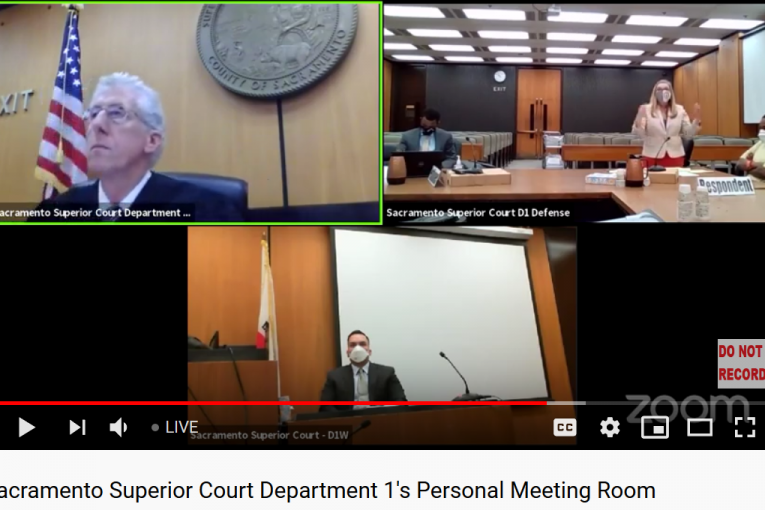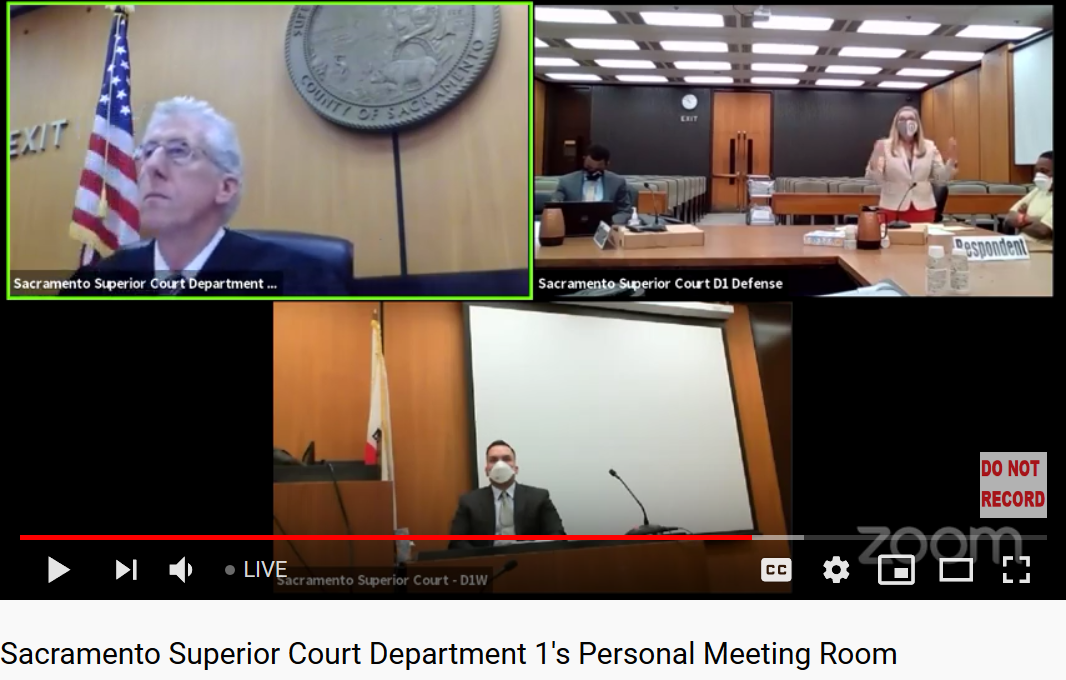

By Crescenzo Vellucci
Vanguard Sacramento Bureau Chief
SACRAMENTO – It’s rare, but a defendant in Sacramento County Superior Court refused to have her preliminary hearing held via the video streaming service Zoom this past week, forcing the court to have it the “old-fashioned way” – in a real courtroom, with real witnesses, real lawyers and real judges, and not images flashed on a computer screen.
Since Zoom courts have operated this past month, judges preface them by asking defendants if they agree. Virtually all of them do.
Shante Combs, facing felony assault with a deadly weapon and misdemeanor obstruction of a police officer, literally had her day in court – not virtual court – after turning down an offer of five years probation, according to evidence presented to the court.
If convicted, she stands to spend real time, in real jail.
And while the preliminary hearing in Dept. 1 – a rarity since virtually every arraignment or preliminary hearing has been held in the jail courts via Zoom because of the COVID-19 shutdown for the last month – it’s about the only kind trial, preliminary or not, there will be for a while in a real courtroom before a jury.
That’s because late last week, the same day Combs forced the in-person hearing, Tani G. Cantil-Sakauye, Chief Justice of California and Chair of the Judicial Council, announced an extension of her 60-day continuance of criminal jury trials and the 60-day extension of time in which to conduct a criminal trial another 30 days.
She said she issued the order “After careful consideration, balancing the constitutional due process rights of parties in criminal proceedings with the health and safety of these parties, the  public, court staff, judicial officers, attorneys, witnesses, jurors, and others present at these proceedings, among other considerations.”
public, court staff, judicial officers, attorneys, witnesses, jurors, and others present at these proceedings, among other considerations.”
In effect, that means no trials – in particular, jury trials – will be heard in any state Superior Court until at least June 15. Probably.
One of the major concerns the courts had back in March with the COVID-19 pandemic is that jurors would not be happy about having to attend trials crammed into packed courtrooms. With stay-at-home orders, and social distancing, it would make it largely impossible.
One judge said that he’d have a “unhappy jurors” to deal with.
That said, the Judicial Council did leave the door open just a little that some trials could take place.
“Courts are strongly encouraged to collaborate with local justice partners to conduct a trial at an earlier date, if a court may do so in compliance with applicable health and safety laws, regulations, and orders, including through the use of remote technology, when appropriate,” said Cantil-Sakauye.
“This relief is temporary, intended to address the current COVID-19 pandemic as it poses a challenge to court proceedings. I reserve the authority to rescind or modify this order, as appropriate, to address changing circumstances,” the chief justice added.
In Combs’ case, the defendant, defense counsel, prosecutor all wore masks. The judge and one deputy in court did not, from what could be seen on the Zoom camera.
Judge Gevercer, just as proceedings were to begin, quipped that – because the courthouse has been closed to the pubic since March – that “there is no one in the audience to exclude.”
Witness Andrew Durham, a deputy sheriff – who was also masked – said that he and other deputies were called to an apartment complex in early April where there were reports of a disturbance involving Combs, some other people and “dogs.”
Before he could exit his vehicle, deputy Durham said he saw a vehicle “driving about 30 to 40 miles an hour…tires screeching, engine revving…trying to hit” an Antonio Vaughn.
“If he (Vaughn) had not made a quick right maneuver to get out of her path…it was a narrow miss…he would have been hit,” testified the deputy.
He and other deputies “struggled” with Combs before arresting her, he said.
Upon cross examination by assistant public defender Naomi Coady, deputy Durham admitted he did see “three Black makes” yelling toward the apartment complex.
He added that he heard someone in the group say they were going to “bounce out” – the deputy said that meant they were going to “fight.” He also said one of them had a “small pocket knife.”
Coady also presented evidence that Vaughn said the car wasn’t going 30-40 mph, and that he could not “ID” the driver.
She asked the judge to reduce the felony assault with a deadly weapon (the car) to a misdemeanor.
Instead, while the court said the defense had raised “some reasonable doubt,” only a “preponderance” of guilt was necessary to move forward in a preliminary hearing.
Judge Gevercer then held Combs for felony assault and the misdemeanor interference with a police officer. She will be arraigned May 13 to stand trial – it would probably be no earlier than September if COVID-19 restrictions are still in place.
To sign up for our new newsletter – Everyday Injustice – https://tinyurl.com/yyultcf9

